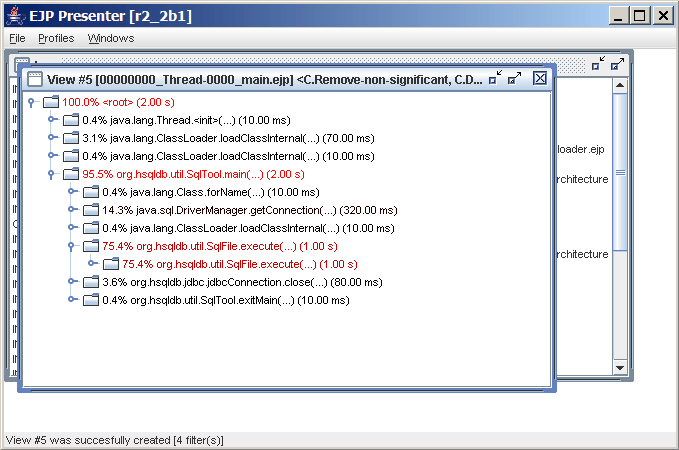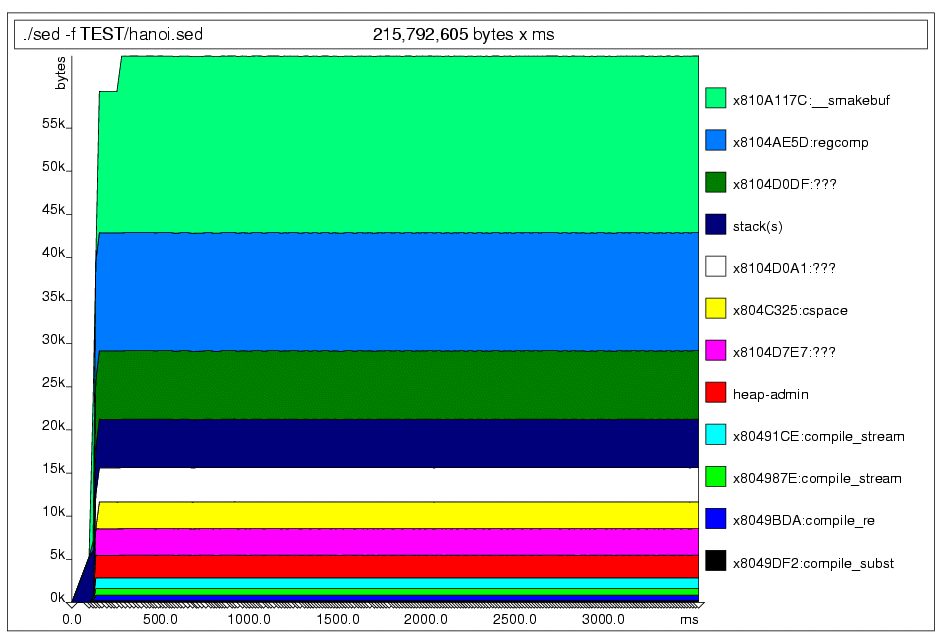Performance Measurement and Management
Diomidis Spinellis
Department of Management Science and Technology
Athens University of Economics and Business
Athens, Greece
dds@aueb.gr
Program States
- Directly executing code (user time)
- The kernel executes code on behalf of the program (system time)
- Waiting for an external operation to complete (idle time)
Also
- Real or clock time
- CPU time
Measuring Workload
- For terminating processes use the time command
$ time make
[...]
real 0m9.380s
user 0m2.580s
sys 0m6.640s
- For servers use top
22:14:03 up 5:22, 2 users, load average: 0.00, 0.01, 0.00
39 processes: 38 sleeping, 1 running, 0 zombie, 0 stopped
CPU states: 0.1% user, 0.4% system, 0.0% nice, 99.5% idle
Workload and Tools
| Profile |
r >>u+s |
s >u |
u ≈ r |
|---|
| Characterization |
I/O-bound |
kernel-bound |
CPU-bound |
|---|
| Tools |
Disk, net, VM stats, packet dumps |
System call tracing |
Function profiling, basic block counting |
|---|
System Monitoring Tools
- I/O
- iostat (under *BSD), vmstat (Linux)
- Memory
- vmstat, free (Linux)
- Network
- netstat
Example: virtual memory statistics while executing the find command
$ vmstat 1
procs memory swap io system cpu
r b w swpd free buff cache si so bi bo in cs us sy id
1 0 0 0 52296 3476 50092 0 0 340 0 189 190 0 6 94
0 1 0 0 51736 3588 50428 0 0 448 0 214 243 0 5 95
1 0 0 0 51072 3716 50724 0 0 424 0 210 218 0 5 95
0 1 0 0 50596 3848 50968 0 0 376 0 196 204 0 4 96
1 0 0 0 49952 3976 51304 0 0 464 0 220 247 0 6 94
0 1 0 0 49556 4068 51512 0 0 300 0 177 172 2 2 96
1 0 0 0 49024 4132 51816 0 0 368 0 196 195 0 7 93
1 0 0 0 48228 4200 52416 0 0 668 0 270 307 0 9 91
1 0 0 0 47668 4352 52712 0 0 448 0 215 227 0 5 95
1 0 0 0 47048 4412 53092 0 0 440 0 213 244 1 5 94
0 1 0 0 44912 4668 54080 0 0 432 0 211 225 0 4 96
Profiling System Calls
- The strace -c flag counts calls and reports time
- The results typically follow a Pareto distribution
Example:
$ strace -c find . -name test
% time seconds usecs/call calls errors syscall
------ ----------- ----------- --------- --------- ----------------
66.06 0.367503 584 629 getdents64
26.31 0.146389 80 1826 lstat64
2.27 0.012621 40 313 fcntl64
1.83 0.010168 31 326 10 open
1.78 0.009894 16 625 chdir
1.23 0.006846 22 316 fstat64
[...]
Function Profiling
- Statistical (prof)
- Graph-based (gprof, Java)
- Pinpoint hotspots
Profiling C/C++ Code with Gprof
- Compile with gcc -pg
- Execute program; a file gmon.out will be produced
- The gprof program produces the report
A Flat Profile
Flat profile:
Each sample counts as 0.01 seconds.
% cumulative self self total
time seconds seconds calls ms/call ms/call name
6.35 0.33 0.33 _Unwind_SjLj_Register
5.77 0.63 0.30 10192020 0.00 0.00 __gnu_norm::__deque_buf_size(unsigned int)
1.54 1.53 0.08 10 8.00 118.33 parse_parse()
1.35 1.60 0.07 5096343 0.00 0.00 operator==(Tokid, Tokid)
A Call Graph Profile
index % time self children called name
10 Pdtoken::process_pragma() <cycle 1> [360]
[4] 22.8 0.08 1.10 10 parse_parse() <cycle 1> [4]
0.00 0.42 8348/17593 Token::unify(Token const&, Token const&) [5]
0.00 0.26 4328/4328 Type::declare() [28]
0.00 0.22 3511/3511 completed_typedef(Type) [33]
0.00 0.03 3529/3540 Block::enter() [220]
0.00 0.02 7402/27543 obj_lookup(std::string const&) [94]
0.00 0.02 812361/834736 YYSTYPE::operator=(YYSTYPE const&) [324]
0.01 0.01 85359/295237 Type::~Type() <cycle 3> [429]
0.00 0.02 1690/1690 Call::register_call(Token const&, Id const*) [331]
0.00 0.02 11362/11362 Type::set_abstract(Type) <cycle 4> [581]
Profiling Java Code with EJP
- Add the tracer library to your library path
- Run program under the Java VM with -Xruntracer
- View the results with the EJP Presenter
A Java Program Profile

Basic Block Counting in C/C++ Code
To investigate algorithms count the number of times each line is executed.
- Compile with gcc -pg -g -fprofile-arcs -ftest-coverage
- Execute program; a file name.bb will be created
- Run gcov -l name.bb
- A .gcov file for each source file will be created
Example:
main(int argc, char *argv[])
{
1 int i, j, k;
1 int a = 0;
11 for (i = 0; i < 10; i++)
110 for (j = 0; j < 10; j++)
1100 for (k = 0; k < 10; k++)
1000 a += i + j + k;
1 }
Architectural Inefficiencies
- Cache misses
- Branch mispredicts
- Front end stalls (failure to deliver enough instructions)
- Cache pollution through address aliasing (set associativity issues)
- Long latency instructions
- TLB misses
Architectural Profiling Tools
- Processor event monitoring
- Oprofile (http://oprofile.sourceforge.net/) (Linux)
- Locality optimizations
- SLO: Suggestions for Locality Optimizations (http://slo.sourceforge.net/)
Events that Oprofile can analyze on a Core 2 Intel CPU.
- Clock cycles when not halted
- number of instructions retired
- number of L2 cache requests
- L2 cache demand requests from this core
- Page table walk events
- cycles divider is busy
- L1 cacheable data read operations
- Bus cycles when data is sent on the bus
- number of instruction fetch misses
- Branch predicted taken with bubble 1
- [100 more]
Memory Performance
Memory as important as CPU cycles
- Difference in latency between memory types
- Large data sets
- Embedded applications
- Bandwidth requirements
Again, we need to profile
Memory Profiling C/C++ Code with Valgrind
- Create a debug build (-g)
- Run the program under valgrind
- Examine valgrind's output
- Can also detect memory leaks
Example: sed under valgrind
echo ':abcdefgh: : :' |
valgrind --tool=massif ./sed -f TEST/hanoi.sed

 Last change: Sunday, December 6, 2009 8:13 pm
Last change: Sunday, December 6, 2009 8:13 pm

